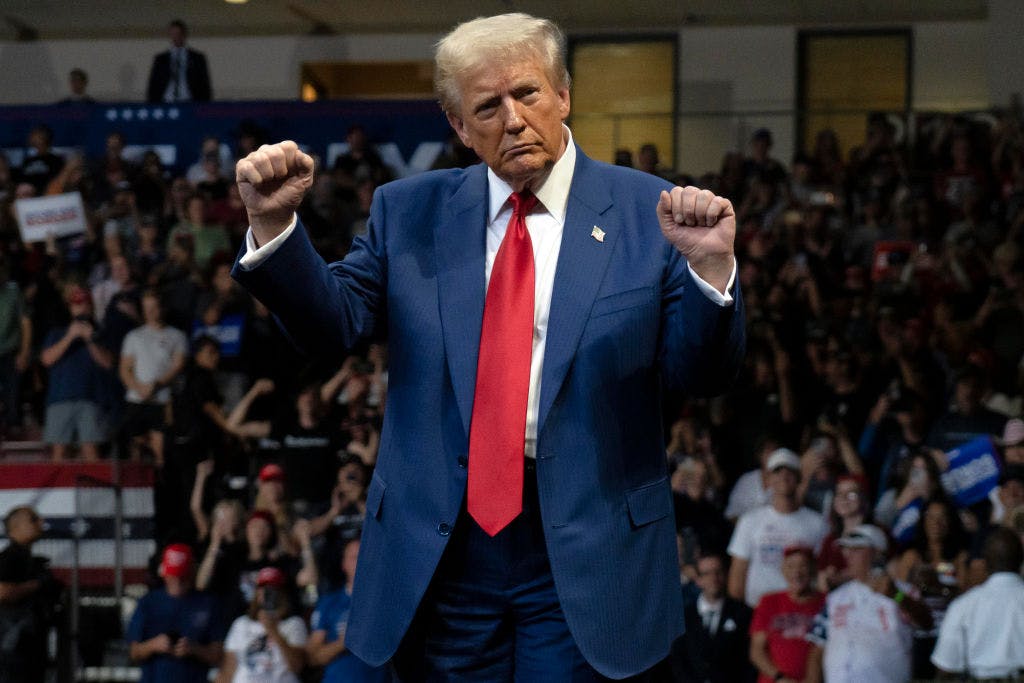The calculus behind betting on a Trump win: his stock, or prediction markets?
DJT has not been a particularly reliable barometer for Trump’s perceived odds of winning the election, but that doesn’t necessarily mean it’s a bad bet.
Shares of Trump Media & Technology Group spiked 18.5% to open the week, continuing a ridiculous run that’s seen the stock gain about 150% since its September 23 low.
The rise has coincided with a big improvement in Republican nominee Donald Trump’s chances of winning the presidential election — at least in the eyes of prediction markets.
Over in the options market, traders are betting that the recent volatility is just a warm-up for what awaits once the vote plays out. The stock is priced to move roughly 26% each day in the week of the election. If we presume much of the volatility premium is tied to the vote (a safe assumption!) then we’re probably looking at an election-aftermath move in the neighborhood of double that being embedded in these options.
This raises the question: what are the relative merits of betting on a Trump win using prediction markets compared to the stock or options markets, now that all these choices have effectively amalgamated?
The payout structure on platforms that allow you to bet on election results is relatively straightforward. In this instance, a wager that Trump would win the presidential election would pay out at about an 84% return if successful, based on current odds.
Now, let’s turn to betting on Trump using the proxy of his stock. Looking at its closing price of almost $30 on Monday, shares of Trump Media & Technology Group would need to rally to $54 to match what’s on offer from prediction markets — a closing level achieved only four times since the ticker debuted on March 26.
The options payout structure is a lot more complex, and we’ll use some simplifying assumptions (via Bloomberg) that indicate about a 55% rally in the stock required to generate that same 84% return via the November 8 contract with the highest open interest (assuming you’re holding to expiry). These options are so expensive — because the stock is expected to move so much on the election result — that it diminishes the potential for massive gains. Options that expire before the election, by comparison, are much cheaper.
All I’ve done so far is outline the levels that different financial instruments would need to get in order to equal the return that’s achievable in prediction markets. That doesn’t answer the questions of why or whether DJT would rally that much in the first place.
DJT has not been a particularly reliable barometer for Trump’s perceived odds of winning the election. Yes, the two have certainly moved higher hand-in-hand recently. Shares also got a bump after the mid-July attempted assassination of the former president. But the stock didn’t rise after President Joe Biden’s brutal debate performance.
And even as Trump’s election prospects steadied and improved to above 50% from mid-August to early September, DJT lost more than a quarter of its value.
That’s because while this is also a temperature check on Trump’s election prospects, it is also a company — a company that loses a lot of money, seeing $16 million in red ink as of its most recent quarter on revenues of less than $1 million.
But it seems safe to say that a world in which Trump wins the election is much better for the stock (and the company) compared to one in which he fails to regain the presidency. To play devil’s advocate, I guess you could benchmark the stock’s peak ($66.22) and suggest that if it were able to trade there without Trump being POTUS, then it could certainly trade there in a hurry if he were. One can imagine a world in which Truth Social has more cachet and monetization potential if government officials are highly encouraged and/or mandated to release official statements there before anywhere else, for instance.
But it seems likely that you’d also need something of a temporary, collective suspension of disbelief for this to play out, given Truth Social’s lack of operational success to date. Of course, if things in markets aren’t efficient when people get really excited about a struggling brick-and-mortar retailer, there’s no reason to expect rational price action when one of the biggest cults of personality in the history of American politics intersects with market momentum.
This is ultimately about judging the relative merits of a bet in which you, in theory, have a 53% chance of making an +80% return if you’re right versus other bets where you have a ??? (joint probability of Trump winning and DJT shares being meme-worthy) chance of making a ??? return.
From this perch, it really doesn’t look too efficient to be using DJT or any of its derivatives to bet on a Trump win — not when a much less convoluted and substantial return (through platforms that can now be used by Americans!) is available.
But if you’re thinking that a Trump win will get fully priced before the election results, that’s a completely different story.
DJT and its derivatives look like a much better way to bet on the idea that more people will think Trump will win the election than they are vehicles to benefit from Trump actually winning the election.
